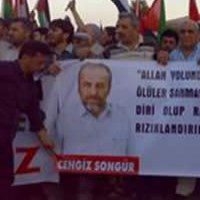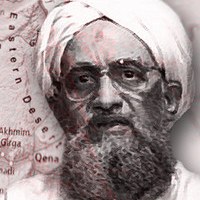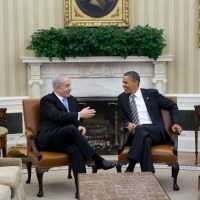Published: may 11, 2010; Medvedev sees Hamas leader in Damascus, an affront to US and Israel.
Before Israel’s president Shimon Peres had time to unpack his bags from his Moscow visit, Russian President Dmitry Medvedev was closeted with the Palestinian terrorist leader, Hamas’ Khaled Meshaal in Damascus (chairman of Hamas’ political bureau), Tuesday, May 11. Present too were Syrian president Bashar Assad and leaders of the extremist Palestinian organization in Syria and Lebanon.

Syria's President Assad (R) chats with his Russian counterpart Medvedev (L) upon his arrival in Damascus
In Jerusalem, Prime Minister Binyamin Netanyahu, apparently unaware of the Russian president’s plan to meet the heads of Israel’s arch-foe Hamas, referred earlier to Medvedev’s comment that Moscow seeks a role in Middle East peacemaking by welcoming any constructive contribution to the effort. He also accused Tehran of warmongering between Syria and Israel.
Monday, the day the Russian leader arrived in Damascus, debkafile’s sources predicted his visit would be the occasion for a weapons deal which might even be a secret back door for Iran to acquire the sophisticated weapons Moscow has denied to date.
The Russian president said he hoped Palestinian unity could be restored and than Fatah and Hamas could reach an agreement (RIA Novosty Newswire, May 12, 2010). Medvedev hinted at Hamas participation in the peace process, saying that peace would not be achieved unless Hamas joined the negotiations. He also said that no one should be prohibited from participating in Middle East peace talks and that Hamas should be included, even though it is regarded as a terrorist organization (Haaretz, May 12, 2010). [The Intelligence and Terrorism Information Center, may 17, 2010.]
It was also an opportunity for Moscow to dramatize its polar differences on Iran with Washington by gestures of support for the extremist Tehran-Damascus-Hizballah-Hamas alignment in the Middle East at the expense of the pro-Western moderate bloc led by Egypt and Saudi Arabia. Last week, Egyptian president Hosni Mubarak brusquely refused to receive Assad for a get-well visit to Sharm el-Sheikh.
Both Washington and Jerusalem were unpleasantly surprised by Moscow’s willingness to provide Bashar Assad with a public shot in the arm just a week after the Obama administration renewed US sanctions against Syria, citing its support for terrorist groups and pursuit of weapons of mass destruction as an “extraordinary threat” to American national security. Syria is widely shunned in the Middle East itself.
In Jerusalem, Israeli government leaders were too busy with the reopening of indirect talks with the Palestinians to gear up in time to seriously forestall the damage to Israel’s interests predicted from expected Russian-Syrian deals and Moscow’s shifting orientation toward the radical Middle East bloc. Medvedev’s surprise meeting with the Hamas leadership Monday was perceived as yet another slap in the face to both Washington and Jerusalem.
President Peres, hurried dispatched to Moscow for Sunday’s events marking the 65th anniversary of the allied victory against the Nazis, found Kremlin leaders deaf when he maintained that Iran and Syria were a danger to Middle East as promoters of terrorist activity. He commented wryly that Syria’s Assad must be the only ruler in the world to treat missiles for Hizballah as a vehicle for peace.
The Israeli Foreign Ministry protested the meeting and strongly criticized the Russian president’s call to include Hamas in the peace process. The Ministry said in a statement that it was deeply disappointed by President Medvedev’s meeting with Khaled Mashaal in Damascus. “Hamas,” said the statement, “is a terrorist organization in every sense of the word,” and “it is totally unacceptable for enlightened nations to divide terrorists into ‘good’ and ‘bad’ according to some geographical division” (Israeli Foreign Minister website, May 12, 2010).
A “senior Hamas figure” told the Arab paper Al-Hayat that the Russian president’s meeting with Khaled Mashaal reflected Moscow’s decision to upgrade its political dialogue with Hamas and to get a first-hand report on its position. The source said that Khaled Mashaal was urging Moscow to exert pressure on Israel to recognize the so-called “rights of the Palestinians” and to lift the “blockade” of the Gaza Strip (Al-Hayat, May 13, 2010). [The Intelligence and Terrorism Information Center, may 17, 2010.]
In a joint communiqué with Assad, Medvedev put forward his own Mideast blueprintput, including:
1 …Putting the entire blame for Mideast tensions on Israel.
2 …Demanding a complete Israeli withdrawal to the pre-1967 lines, which would leave the entire Old City of Jerusalem, including Judaism’s holiest shrines (the Western Wall and Temple Mount), plus Hebron and the Tomb of the Patriarchs (Judaism’s second holiest site), plus the Mount of Olives (the oldest Jewish cemetery in the world) under Palestinian rule.
3 …Demanding that Israel join the Nuclear Non-Proliferation Treaty as a non-nusclear state, which would deprive Israel of its ultimate deterrent against Iranian genocidal threats.
4 …Endorsing Palestinian demands for a “right of return” of millions of refugees and their descendants — a formula for the demographic destruction of the Jewish state.
All this comes at a time when Obama has put all his chips on getting his Mideast envoy, George Mitchell, to mediate indirect peace talks between Israel and the Palestinians — with a U.S. agenda that specifically avoids “outside solutions” like those Medvedev trotted out as Russia’s position during his tête-à-tête with Assad in Damascus.
Obama and Secretary of State Clinton insist instead that only direct negotiations between Israel and the Palestinians can produce a blueprint for peace. In line with this stance, they’ve ruled out imposition of any “outside solution.” However, Medvedev in Damascus has done just that, embracing a joint Syrian-Russian “outside solution” as the Kremlin’s alternative Mideast policy.
Medvedev, with his trip to Damascus, has made a shambles of more than a year’s worth of Obama-Clinton efforts to woo Moscow with pledges to “reset” U.S. diplomacy with a kinder, gentler approach. The Russian president instead has laid down the gauntlet to Washington that Russia intends to go its own way in the Middle East with a radically different agenda from Obama’s. He is clearly signaling Palestinians and Arab rulers that the Russian bear is ready to challenge Obama and denying him the role of the only indispensable “peacemaker” in the region. [American Thinker].



 RSS
RSS










Russian President Meets Khaled Mashaal in Damascus #russia #hamas #terrorism http://j.mp/bJxVyK
[…] The rest is here: Russian President Meets Khaled Mashaal in Damascus | Middle East … […]
RT @CrethiPlethi: Russian President Meets Khaled Mashaal in Damascus #russia #hamas #terrorism http://j.mp/bJxVyK
[…] This post was mentioned on Twitter by Elisabeth, Crethi Plethi. Crethi Plethi said: Russian President Meets Khaled Mashaal in Damascus #russia #hamas #terrorism http://j.mp/bJxVyK […]